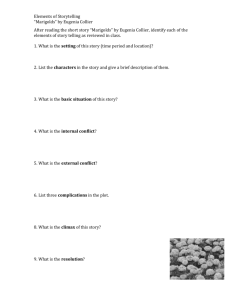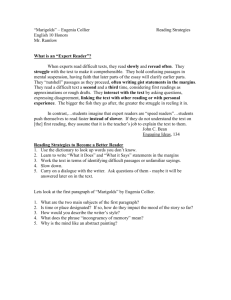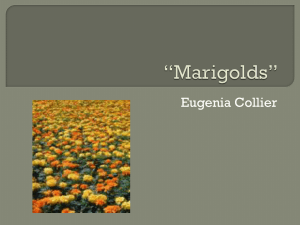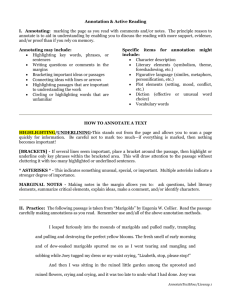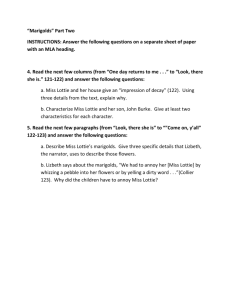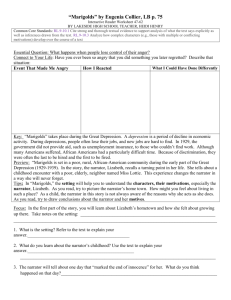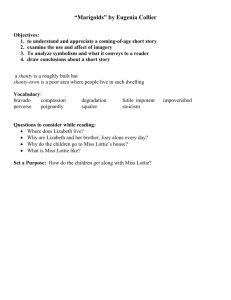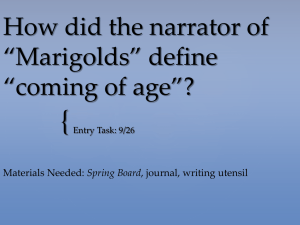“Marigolds” Study Guide
advertisement
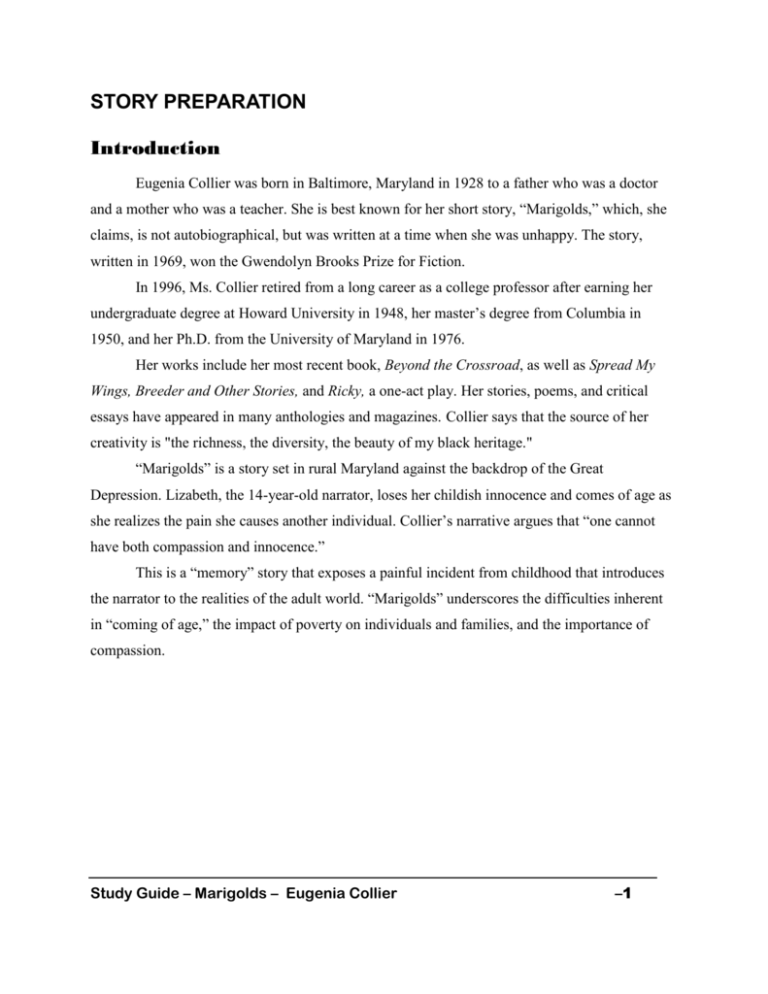
STORY PREPARATION Introduction Eugenia Collier was born in Baltimore, Maryland in 1928 to a father who was a doctor and a mother who was a teacher. She is best known for her short story, “Marigolds,” which, she claims, is not autobiographical, but was written at a time when she was unhappy. The story, written in 1969, won the Gwendolyn Brooks Prize for Fiction. In 1996, Ms. Collier retired from a long career as a college professor after earning her undergraduate degree at Howard University in 1948, her master’s degree from Columbia in 1950, and her Ph.D. from the University of Maryland in 1976. Her works include her most recent book, Beyond the Crossroad, as well as Spread My Wings, Breeder and Other Stories, and Ricky, a one-act play. Her stories, poems, and critical essays have appeared in many anthologies and magazines. Collier says that the source of her creativity is "the richness, the diversity, the beauty of my black heritage." “Marigolds” is a story set in rural Maryland against the backdrop of the Great Depression. Lizabeth, the 14-year-old narrator, loses her childish innocence and comes of age as she realizes the pain she causes another individual. Collier’s narrative argues that “one cannot have both compassion and innocence.” This is a “memory” story that exposes a painful incident from childhood that introduces the narrator to the realities of the adult world. “Marigolds” underscores the difficulties inherent in “coming of age,” the impact of poverty on individuals and families, and the importance of compassion. Study Guide – Marigolds – Eugenia Collier –1 First impressions After reading "Marigolds" jot down your own questions, thoughts, confusions and impressions. What intrigues you about this story? What catches your attention? Make some notes on the story or in the space below. Study Guide – Marigolds – Eugenia Collier –2 APPLYING THE METHOD Poetics Moments in the story where the use of metaphor, simile, repetition, rhythm or voice may prompt discussion. 1. “When I think of the hometown of my youth, all that I seem to remember is dust – the brown, crumbly dust of late summer – arid, sterile dust that gets into the eyes and makes them water, gets into the throat and between the toes of bare brown feet. I don‟t know why I should remember the dust.” (p.228, line 1) 2. …”But memory is an abstract painting – it does not represent things as they are, but rather as they feel.” (p.228) 3. “And one other thing I remember, another incongruency of memory – a brilliant splash of sunny yellow against the dust – Miss Lottie‟s marigolds.” (p. 228) 4. “I feel again the chaotic emotions of adolescence, illusive as smoke, yet as real as the potted geranium before me now.” (p. 228) 5. “Joy and rage and wild animal gladness and shame become tangled together in the multicolored skein of fourteen-going-on-fifteen as I recall that devastating moment…” (p. 228) 6. “I remember them vividly now as I desperately pass away the time waiting for you, who will not come.” (p.228) “But God was chary with miracles in those days, and so we waited – and waited.” (p. 229) 7. “Poverty was the cage in which we were all trapped, and our hatred of it was still the vague, undirected restlessness of the zoo-bred flamingo who knows that nature created him to fly free.” (p. 229) 8. “For the most part, those days are ill defined in my memory, running together and combining like a fresh watercolor painting left out in the rain.” (p.229) 9. “I remember…” “I remember…” “And I remember, that year, a strange restlessness of body and of spirit, a feeling that something old and familiar was ending, and something unknown and therefore terrifying was beginning.” (p. 229) 10. “A little cloud of dust followed our thin legs and bare feet as we tramped over the barren land.” (p. 230) Study Guide – Marigolds – Eugenia Collier –3 11. “The boards themselves seemed to remain upright, not from being nailed together, but rather from leaning together like a house that a child might have constructed from cards.” (p. 230) 12. “But old fears have a way of clinging like cobwebs, and so when we sighted the tumbledown shack, we had to stop to reinforce our nerves.” (p. 230) 13. “Beyond the dusty brown yard, in front of the sorry gray house, rose suddenly and shockingly a dazzling strip of bright blossoms, clumped together in enormous mounds, warm and passionate and sun-golden.” (p.231) 14. “I said before that we children were not consciously aware of how thick were the bars of our cage. I wonder now, though, whether we were not more aware of it than I thought.” (p. 232) 15. “The child in me sulked and said it was all fun, but the woman in me flinched at the thought of the malicious attack that I had led.” (p. 233) 16. “My mother‟s voice was like a cool, dark room in summer – peaceful, soothing, quiet.” (p. 233) 17. “Everything was suddenly out of tune, like a broken accordion.” (p. 234) 18. “I lay on the pallet, still as stone…” (p. 234) 19. “But the room was too crowded with fear to allow me to sleep…” (p. 234) 20. “I was running as if the Furies were after me, as perhaps they were – running silently and furiously …” (p. 234-5) 21. “The half-dawn light was more eerie than complete darkness, and in it the old house was like the ruin that my world had become – foul and crumbling, a grotesque caricature.” (p. 235) 22. “For one does not have to be ignorant or poor to find that this life is barren as the dusty yards of our town. And I, too, have planted marigolds.” (p. 236) Study Guide – Marigolds – Eugenia Collier –4 Record your own notes: thoughts, other instances of poetics, etc. Additional space is on page at end of this section. Tensions / contrasts Meaningful tensions or juxtapositions in the story. 1. Rite of passage between childhood and adulthood: “I recall that devastating moment when I was suddenly more woman than child…” (p. 228) “I did not join the merriment when the kids gathered again under the oak in our bare yard. Suddenly I was ashamed, and I did not like being ashamed.” (p. 233) “I scrambled to my feet and just stood there and stared at her, and that was the moment when childhood faded and womanhood began. That violent, crazy act was the last act of childhood….I gazed upon a kind of reality which is hidden to childhood.” (p. 235) “The years have put words to the things I knew in that moment, and as I look back upon it, I know that that moment marked the end of innocence.” (p. 236) 2. Memory and reality: “Memory is an abstract painting – it does not present things as they are, but rather as they feel.” (p. 228) “For the most part, those days are ill defined in my memory, running together and combining like a fresh watercolor painting left out in the rain….One day returns to me with special clarity for some reason, perhaps because it was the beginning of the experience that in some inexplicable way marked the end of innocence.” (p. 229-30) 3. Poverty and wealth: “All that I seem to remember is dust…” “Surely there must have been lush green lawns and paved streets under leafy shade trees somewhere in town…” (p. 228) “The Depression that gripped the nation was no new thing to us, for the black workers of rural Maryland had always been depressed.” (p.229) “I don‟t know what we were waiting for; certainly not for the prosperity that was „just around the corner,‟ for those were white folks‟ words, which we never believed.” (p. 229) “‟I git paid every week, and Mrs. Ellis is real nice about giving me things. She gonna let me have Mr. Ellis‟s old coat for you this winter – „Damn Mr. Ellis‟s coat! And his damn money! You think I want white folks‟ leavings?‟” (p. 234) Study Guide – Marigolds – Eugenia Collier –5 4. Poverty and family: “By the time I was fourteen my brother Joey and I were the only children left at our house, the older ones having left home for early marriage or the lure of the city, and the two babies having been sent to relatives who might care for them better than we.” (p. 229) “I did not know men ever cried…My father was a strong man who could whisk a child upon his shoulders and go singing through the house…But the sobs went on, unstifled, finally quieting…” (p. 234) “The world had lost its boundary lines…Everything was out of tune, like a broken accordion. Where did I fit into this crazy picture?” (p. 234) 5. Work vs reward: “Nor did we wait for hard work and thrift to pay off in shining success as the American Dream promised, for we knew better than that, too. Perhaps we waited for a miracle, amorphous in concept but necessary if one was to have the grit to rise before dawn each day and labor in the white man‟s vineyard until after dark, or to wander about in the September dust offering one‟s sweat in return for some meager share of bread.” (p. 229) “Each morning our mother and father trudged wearily down the dirt road and around the bend, she to her domestic job, he to his daily unsuccessful quest for work.” (p. 229) “‟Twenty-two years, Maybelle, twenty-two years,‟ he was saying, „and I got nothing for you, nothing, nothing.‟” (p. 233) “‟God knows I try…What must a man do, tell me that?‟” (p. 233) 6. Beauty and decay: “One other thing I remember, another incongruency of memory – a brilliant splash of sunny yellow against the dust – Miss Lottie‟s marigolds.” (p. 228) “Miss Lottie‟s marigolds were perhaps the strangest part of the picture. Certainly they did not fit in with the crumbling decay of the rest of her yard.” (p. 231) 7. Innocence vs compassion: “I opened my swollen eyes and saw in front of me a pair of large callused feet; my gaze lifted to the swollen legs, the age-distorted body clad in a tight cotton nightdress, and then the shadowed Indian face surrounded by stubby white hair. There was no rage in the face now, now that the garden was destroyed and there was nothing any longer to be protected.” (p.235) “Whatever verve there was left in her, whatever was of love and beauty and joy that had not been squeezed out by life had been there in the marigolds she had so tenderly cared for.” (p. 235) “Innocence involves an unseeing acceptance of things at face value, an ignorance of the area below the surface. In that humiliating moment I looked beyond myself and into the depths of another person. This was the beginning of compassion, and one cannot have both compassion and innocence.” (p. 236) 8. Fear and violence: “I do not now remember my thoughts, only a feeling of great bewilderment and fear.” (p.234) “…the room was too crowded with fear to allow me to sleep…” (p. 234) “I was running as if the Furies were after me…” (p. 234) “I had indeed lost my mind, for all the smoldering emotions of that summer swelled in me and burst – the great need for my mother, who was never there; the hopelessness of our poverty and degradation; the bewilderment of being neither child nor woman and yet both at once; the fear unleashed by my father‟s tears. And these feelings combined in one great impulse toward destruction.” (p. 235) Study Guide – Marigolds – Eugenia Collier –6 9. Youth and age: “I feel again the chaotic emotions of adolescence, illusive as smoke, yet as real as the potted geranium before me now.” (p. 228) “After a few chores around the tumbledown shanty, Joey and I were free to run wild in the sun with other children similarly situated.” (p. 229) “Miss Lottie seemed to be at least one hundred years old. Her big frame still held traces of the tall, powerful woman she must have been in youth, although it was now bent and drawn.” (p. 231) “We had to annoy her by whizzing a pebble into her flowers or by yelling a dirty word, then dancing away from her rage, reveling in our youth and mocking her age.” (p. 232) “Then the rest of the kids let loose with their pebbles, storming the flowers and laughing wildly and senselessly at Miss Lottie‟s impotent rage.” (p. 232) 10. Consciousness and unexplained feelings: “For some perverse reason, we children hated those marigolds. They interfered with the perfect ugliness of the place; they were too beautiful; they said too much that we could not understand; they did not make sense.” (p. 231-2) “It should have been a comical sight… but it wasn‟t comical, it was something we could not name.” (p. 232) “Perhaps we had some dim notion of what we were, and how little chance we had of being anything else. Otherwise, why would we have been so preoccupied with destruction?” (p. 232) Record your own notes: thoughts, other instances of tensions/contrasts, etc. Additional space is on page at end of this section. Shadows Questions, missing pieces, elements that are oblique or not fully explained. 1. Why does the narrator remember the marigolds in the context of “waiting for you, who will not come”? Who is “you”? 2. Why does Miss Lottie and her marigolds become a target for the children? 3. What does the author mean by “memory is an abstract painting”? Study Guide – Marigolds – Eugenia Collier –7 4. What impact does the Depression have on the families – both children and parents – of those already poor? 5. Why does the narrator describe her memory of approaching adolescence as “something unknown and therefore terrifying”? 6. Why does Lizabeth join the group of younger boys, even though she is indifferent, at first, to their game? 7. What impact does the presence of John Burke have on the image of Miss Lottie? Why is he included as a character in the story? 8. What do the marigolds mean to Miss Lottie? Why does the narrator relate that she “never planted marigolds again” after her garden is destroyed? 9. What‟s the connection between the poverty of the children and their impulse toward destruction? 10. What does the father‟s despair about his inability to provide for his family say about the disconnection between hard work and reward? 11. Why is Lizabeth so frightened when she hears her father‟s sobs and realizes that her mother “was now the strength of the family”? 12. What connection does Lizabeth make between her family‟s problems and Miss Lottie‟s marigolds? 13. What does the author mean by her statement that “one cannot have both compassion and innocence”? 14. What does the narrator imply when she claims that “I, too, have planted marigolds.” Record your own notes: thoughts, other instances of shadows, etc. Additional space on page at end of this section. Study Guide – Marigolds – Eugenia Collier –8 Issues Themes, ideas and arguments raised by the text. 1. Memory: As a story that depends on the narrator‟s recall, what impact does time elapsed, emotion, and perspective have on the telling of these events? What does the narrator mean by her memories “running together and combining like a fresh watercolor painting left out in the rain”? 2. Coming of age: What is the narrator‟s perspective on this event that occurred at such a critical time in her life? Why is “fourteen-going-on-fifteen” described as a “multicolored skein”? The narrator describes her emotions just before she attacks the marigolds as fueled by “the bewilderment of being neither child nor woman and yet both at once.” What does she mean by this? 3. Poverty and its impact on families: Lizabeth learns about adult responsibilities, about poverty and its impact on the lives of others, and about compassion. She survives without supervision during the day, and finally recognizes “the great need for my mother, who was never there.” Her younger siblings were sent away to live with relatives and when she hears her father‟s sobs, she knows “the hopelessness of our poverty and degradation.” Miss Lottie is also a victim of poverty, a broken woman who finds hope in the planting of marigolds, who lives in squalor with a “mindless” son who is a the remnant of “her passion.” 4. Fear: When Lizabeth says that “the world has lost its boundary lines,” she loses her sense of comfort in the world as she has known it. Her fear becomes part of the emotions that lead to the destruction of the marigolds and combine with her despair at her father‟s tears. 5. Shame: Why does Lizabeth feel shame after joining the other children in tormenting Miss Lottie? What does this indicate about her maturing sensibilities? 6. Beauty as an antidote for poverty: Miss Lottie‟s marigolds don‟t seem to “belong” in a town gripped by poverty. Why does Miss Lottie choose to bring their beauty to her property? What benefit are they to her? 7. Innocence vs. compassion: The narrator states: “People think of the loss of innocence as meaning the loss of virginity, but this is far from true. Innocence involves an unseeing acceptance of things a face value, and ignorance of the area below the surface. In that humiliating moment I looked beyond myself and into the depths of another person. This was the beginning of compassion, and one cannot have both compassion and innocence.” Is it possible to have compassion if one does not understand the issues that lie beneath the surface? 8. Hopelessness: The father‟s failure to provide for his family lead to hopelessness and longsuffering. “I got nothing for you, nothing, nothing.” (p.233) Miss Lottie‟s hope Study Guide – Marigolds – Eugenia Collier –9 disappears after Lizabeth destroys her marigolds and she never plants marigolds again. She is resigned to live her life in her place of utter squalor and hopelessness. Record your own notes: thoughts, questions, other instances of “issues” in this story. Additional space on page at the end of this section. Experience Questions designed as a bridge between the reader’s lived-life and the story. 1. What kinds of realities are generally hidden from children? Why? 2. What memories from your childhood or adolescence are critical to your understanding of how the world works? Of your sense of yourself in relation to other people? 3. Do you remember doing something that you regret? What did you learn from the experience? 4. Did you know someone like Miss Lottie, someone who was an easy mark for the children of your neighborhood, when growing up? Why was that person selected for harassment? As an adult, how do you feel about how this vulnerable person was treated? 5. What is the connection between poverty, hopelessness, and destruction? 6. When the narrator says “the image of those passionate yellow mounds returns with a painful poignancy,” she is indicating the long-lasting effect of this incident with Miss Lottie‟s marigolds. What impact does the past have on your present perceptions? 7. Have you planted any “marigolds” in your life? Explain. Record your own notes: thoughts, other instances of experience, etc. Additional space on page at end of this section. Study Guide – Marigolds – Eugenia Collier –10 Coordinator Notes Record your own notes: thoughts, other instances of poetics, tensions/contrasts, shadows, issues, experience, possible discussion paths, questions you might consider. Study Guide – Marigolds – Eugenia Collier –11 – DISCUSSION PATHS Introducing the story before reading the story, you might want to: 1. Share biographical information about Eugenia Collier. 2. Invite participants to think about an incident in their childhood that is memorable to them. Ask them to consider the impact that the incident – or the memory of that incident – has had on their adult lives. 3. If you plan to conclude the session by inviting participants to write, you might offer either of these prompts: Write about something you regret doing in your childhood or adolescence. What did you learn from the experience? Can one have both innocence and compassion? Explain. Select a quote from the story and write about what it means to you. DISCUSSION QUESTIONS Poetics P Tensions/Contrasts C Shadows S Issues I Experience E ______________________________________________________________________________ 1. Memory/Childhood “Memory is an abstract painting – it does not present things as they are, but rather as they feel.” (p. 228) P, C, E How does one‟s memory color the actual events of the past? What impact do emotion, time, and perspective have on one‟s memory? What is your impression of the narrator‟s memory of this incident with Miss Lottie? Would her account differ from that of her brother? Why or why not? “I desperately pass away the time waiting for you, who will not come. I suppose that futile waiting was the sorrowful background music of our impoverished little community when I was young.” (p. 228) P, C ,S What/who is the narrator waiting for? Why won‟t the expected come? What‟s the connection to the waiting she remembers from childhood? Explain the phrase “the sorrowful background music of our impoverished little community.” Study Guide – Marigolds – Eugenia Collier –12 – 2. Poverty/Destruction “Poverty was the cage in which we all were trapped, and our hatred of it was still the vague, undirected restlessness of the zoo-bred flamingo who knows that nature created him to fly free.” (p. 229) P, I, C Why does the narrator use this image? How are poor people trapped in a “cage”? What was the children‟s perception of their lot in life? When did Lizabeth first understand the pain of poverty? “Perhaps we had some dim notion of what we were, and how little chance we had of being anything else. Otherwise, why would we be so preoccupied with destruction?” (p.232) I ,E Why didn‟t the children have a chance to escape the poverty of their surroundings? What would give the children a “dim notion” of their lot in life? What‟s the connection between the repression felt by the children and their propensity for destruction? 3. Marigolds “For some perverse reason, we children hated those marigolds. They interfered with the perfect ugliness of the place; they were too beautiful; they said too much that we could not understand; they did not make sense.” (p. 231) I, S Why did the children “hate the marigolds”? Can something be “too beautiful”? Explain. What was it that the marigolds “said” that the children could not understand? 4. Coming of Age “I did not join the merriment when the kids gathered again under the oak in our bare yard. Suddenly I was ashamed, and I did not like being ashamed. The child in me sulked and said it was all in fun, but the woman in me flinched at the thought of the malicious attack that I had led.” (p. 233) I,E Lizabeth does not join the “kids” in celebrating their harassment of Miss Lottie, and then she expressed shame. Why? What‟s the difference between the way the “child” in her acted and the “woman” in her responded? What‟s happening here? How does “shame” indicate a growth in one‟s understanding of other people? Study Guide – Marigolds – Eugenia Collier –13 – 5. Disruption of innocence “The world had lost its boundary lines…Everything was suddenly out of tune, like a broken accordion.” (p. 234) P, I Why is Lizabeth so lost? What has changed in her perception of the world? What were her “boundary lines” before hearing her father‟s cries? “I had indeed lost my mind, for all the smoldering emotions of that summer swelled in me and burst – the great need for my mother, who was never there; the hopelessness of our poverty and degradation; the bewilderment of being neither child nor woman and yet both at once; the fear unleashed by my father‟s tears.” (p. 235) I, T ,E Are these issues the cause of Lizabeth‟s fury and destructive act? Why or why not? What does she understand about her actions once she gains the perspective of age? What impact has poverty had on Lizabeth‟s family? Why is her father so upset? What new role does her mother have to take? What lasting problems could be caused by sending younger children to live with other family members? What do you remember about life as a child that had a lasting impact on you? “…As I gazed at the immobile face with the sad, weary eyes, I gazed upon a kind of reality which is hidden to childhood.” (p. 235) C, E What “reality” is Lizabeth referring to? What kinds of realities are hidden from children? Why? How does this experience – of seeing Miss Lottie as a victim of her violence – change the way Lizabeth sees herself? 6. Miss Lottie “Whatever verve was left in her, whatever was of love and beauty and joy that had not been squeezed out by life had been there in the marigolds she had so tenderly cared for.” (p. 235) P, S Why did Miss Lottie plant the marigolds? What does it mean about her approach to the hard life she had? What do the marigolds represent to Miss Lottie? 7. Innocence vs. compassion “Innocence involves an unseeing acceptance of things at face value, an ignorance of the area below the surface. In that humiliating moment I looked beyond myself and into the depths of another person. This was the beginning of compassion, and one cannot have Study Guide – Marigolds – Eugenia Collier –14 – both compassion and innocence.” (p. 236) I ,S, E Can one have “both compassion and innocence”? What does this mean? How does this statement describe Lizabeth‟s transformation from child to adult? 8. Story’s end “And I, too, have planted marigolds.” P, I, E What does the author imply in this last line of the story? What are the “marigolds” mentioned here? What‟s the message about the importance of “marigolds” in the lives of adults dealing with the real world? Study Guide – Marigolds – Eugenia Collier –15 – Final Impressions After the session, take some time to make notes about the discussion: interesting points that readers raised, questions that arose, disputes, and confusions. Jot down your own impressions of the session: what worked well; what would you do differently the next time? Study Guide – Marigolds – Eugenia Collier –16 – SUPPLEMENTARY MATERIALS Maya Angelou - I know why the caged bird sings A free bird leaps on the back of the wind and floats downstream till the current ends and dips his wing in the orange suns rays and dares to claim the sky. But a bird that stalks down his narrow cage can seldom see through his bars of rage his wings are clipped and his feet are tied so he opens his throat to sing. The caged bird sings with a fearful trill of things unknown but longed for still and his tune is heard on the distant hill for the caged bird sings of freedom. The free bird thinks of another breeze and the trade winds soft through the sighing trees and the fat worms waiting on a dawn-bright lawn and he names the sky his own. But a caged bird stands on the grave of dreams his shadow shouts on a nightmare scream his wings are clipped and his feet are tied so he opens his throat to sing. The caged bird sings with a fearful trill of things unknown but longed for still and his tune is heard on the distant hill for the caged bird sings of freedom. ________________________________ From the story: “Poverty was the cage in which we all were trapped, and our hatred of it was still the vague, undirected restlessness of the zoo-bred flamingo who knows that nature created him to fly free.” Study Guide – Marigolds – Eugenia Collier –17 – SUGGESTIONS FOR FURTHER READING Books written by Collier: Beyond the Crossroad. Baltimore: Three Sistahs Press, 2009. Breeder and Other Stories. Black Classic Press, 1993. Anthologies including Collier's work: Shaping Memories: Reflections of African American Women's Writers, edited by Joanne Veal Gabbin. Mississippi: University Press of Mississippi, 2009. Books by others: God, Dr. Buzzard, and the Bolito Man: A Saltwater Geechee Talks about Life on Sapelo Island, Georgia. by Cornelia Walker Bailey. New York: Anchor Books, 2000. Study Guide – Marigolds – Eugenia Collier –18 –
